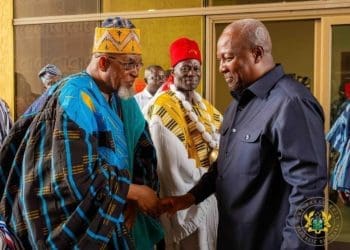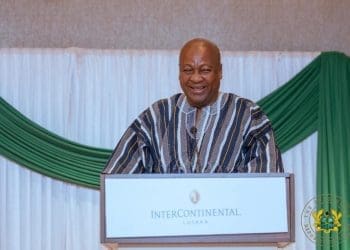The reassignment of the Bogoso-Prestea gold mine lease to Heath Goldfields has ignited one of the most contentious disputes in Ghana’s mining history.
The action provoked accusations that the Ministry of Lands and Natural Resources, the Minerals Commission, and Heath Goldfields acted in concert to unlawfully dispossess Future Global Resources (FGR) and its special purpose vehicle, Blue Gold Bogoso Prestea Limited, of their mining lease.
The controversy is increasingly being seen not as an industrial dispute, but as a state-enabled expropriation executed under the cover of regulatory authority.
What began in October 2020 as FGR’s ambitious plans to revive a struggling mine has now snowballed into a billion-dollar international arbitration, with Ghana’s reputation as a secure investment destination under severe scrutiny.
What should have been a straightforward restructuring process has morphed into a textbook case of dispossession.
Lease reassigned in the shadows
The chronology of events and the eventual reassignment bear all the hallmarks of a coordinated scheme.
With financial commitments secured, Nasdaq-listed backing in place, and ministerial conditional approval granted, there was no lawful basis to revoke the lease.
Yet, the Minerals Commission and Ministry of Lands and Natural Resources withheld essential permits, creating an artificial default.
Heath Goldfields, a company incorporated only on February 6, 2024, with a stated capital of GH₵10,000, applied for the Bogoso-Prestea mining lease just a week later, on February 13 — despite the fact that the lease was still legally held at the time by FGR/Blue Gold.
By a letter dated November 12, 2024, the Ministry of Lands and Natural Resources approved the Minerals Commission’s recommendation to reassign the lease to Heath Goldfields.
In a puzzling twist, just eight days later, on November 20, the Minister issued another letter suspending all processes relating to the reassignment.
But the suspension proved meaningless. By November 24, Heath Goldfields had mobilised to the site, forcibly occupying FGR/Blue Gold’s assets — including vehicles, residential facilities, heavy-duty equipment, and even gold concentrate and tailings stockpiles.
The occupation has been described as a brazen violation of Act 703, since parliamentary ratification, Environmental Protection Authority (EPA) permitting, and other statutory approvals had not been secured.
Acting Managing Director (MD) of Blue Gold, Yiadom Boakye Amponsah, branded the episode “an institutionally sanctioned galamsey, cloaked in officialdom.”
How it all began: FGR’s troubled tenure
FGR had acquired Bogoso-Prestea from Golden Star Resources in October 2020, inheriting not only the mine’s assets but also its heavy debt burden of more than $60 million.
Despite promises to inject capital, restructure operations, and rebuild underground capacity, the company soon faced crippling industrial unrest.
Workers demanded severance packages that should have been settled by Golden Star under Ghana laws.
After tense negotiations, FGR agreed to pay in three tranches — but only managed the first installment.
Salaries were paid, but contributions to Social Security and National Insurance Trust (SSNIT) and Provident Fund accounts fell behind, fuelling discontent.
By late 2023, union agitation reached its peak. Leaders petitioned the Minister to revoke FGR’s lease, openly allying with Minerals Commission officials who were publicly critical of FGR’s management.
Blue Gold’s restructuring plan
In response, FGR created Blue Gold Bogoso Prestea Limited as a special purpose vehicle to spearhead restructuring.
Backed by a multi-billion-dollar mining partner and regional investment banks, Blue Gold floated a $150 million bond, listed on NASDAQ in New York with a $300 million market cap, and secured $80 million facility to restart the mine.
On January 30, 2024, FGR submitted the restructuring plan to the Ministry and the Minerals Commission.
The Ministry granted conditional approval on April 17, requiring proof of financing within 120 days.
By the deadline, FGR had binding financial agreements, including SEC-approved bond documentation.
Yet, despite earlier assurances, the EPA and Mincom withheld permits, preventing operations from restarting.
Instead, on September 19, 2024, Mincom issued a Notice of Termination of the lease.
In January 2025, FGR received another backdated letter confirming the termination.
A coordinated effort?
FGR argued that the denial of permits, the hostility of union leaders, and the Minerals Commission’s actions formed part of a calculated strategy to strip them of the lease.
The establishment of an Interim Management Committee by Mincom — staffed by union leaders and chaired by its Western Regional Manager — only deepened suspicions of collusion.
The speed with which Heath Goldfields — a company with just GH₵10,000 in stated capital and no mining track record — was awarded the same lease, exposes the state’s hand.
The sequence of events reads less like bureaucratic coincidence and more like a cartel operation.
It was not market forces or corporate failure that determined FGR’s fate, but a bureaucratic trap.
Section 68 of Act 703 empowers the Minister to revoke a lease for non-compliance, but nowhere does the law permit the state to reassign an active lease to another company without exhausting arbitration or following due process.
Yet this is exactly what occurred. If regulatory bodies can engineer a dispossession of this magnitude, then no mining company is safe, and the sanctity of contracts becomes meaningless.
For investors, this saga signals risk. What confidence can foreign capital have in Ghana if billion-dollar investments can be stripped away through administrative fiat?
International arbitration and a $1 Billion Claim
Frustrated by what it calls a “state-enabled expropriation,” FGR has taken the matter to international arbitration, demanding $1 billion in damages for wrongful revocation and unlawful reassignment.
The company insists it retains the financial and technical capacity to operate Bogoso-Prestea and has offered to withdraw its claim if its lease is restored.
Arbitration is not just about financial liability; it is about the narrative that Ghana does not honour contracts.
FGR’s arbitration claim paints Ghana as a predatory state — one that encourages investment, sets impossible hurdles, then engineers dispossession when investors stumble.
For global mining firms, that narrative is toxic. If upheld, it could trigger a chilling effect, where no investor wants to commit capital to Ghana’s mining sector for fear of similar treatment.
The reputational damage could ripple beyond mining.
In an era where Ghana is desperately courting foreign direct investment to stabilise its economy, arbitration losses could become a cautionary tale for global capital markets.
If the sanctity of mining leases cannot be guaranteed, then why should financial markets trust sovereign bonds or investment guarantees?
The irony is that Ghana, long praised as West Africa’s most stable mining jurisdiction, now risks being branded a high-risk, contract-breaching state.
A test of governance and credibility
For critics, the Bogoso-Prestea saga is not merely about a company’s struggle but about the credibility of Ghana’s regulatory institutions.
Civil society groups warn that the case could have long-lasting consequences for Ghana’s investment climate.
The road ahead
As arbitration proceeds, workers remain in limbo, severance packages unpaid, and the mine’s future uncertain.
For the government, the stakes are high: not only could it face a billion-dollar penalty, but its reputation for upholding the sanctity of contracts is also on the line.
The Bogoso-Prestea mine, once envisioned as a turnaround project, has instead become a symbol of mistrust, controversy, and what critics say is cartel-like behaviour at the heart of Ghana’s mining sector.












